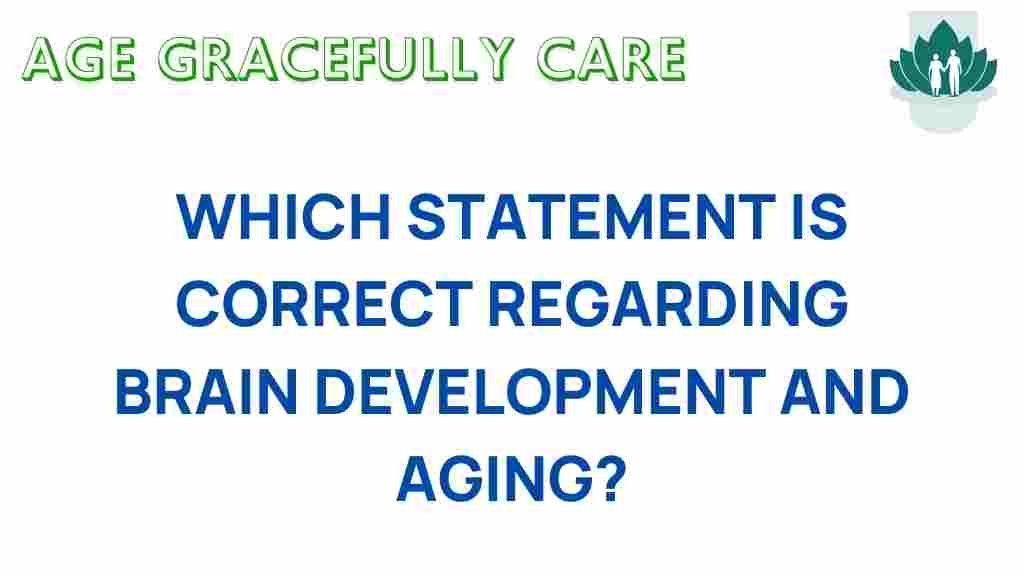Unraveling the Mysteries of Brain Development, Aging, and Cognitive Decline
Understanding how our brains develop and age is crucial for promoting brain health throughout our lives. As we navigate through various stages of life, our brains undergo significant changes that can affect our cognitive abilities, mental health, and overall well-being. In this article, we will explore the processes of brain development and aging, how they relate to cognitive decline, and the potential for neuroplasticity and lifelong learning to mitigate age-related changes.
The Stages of Brain Development
Brain development occurs in several stages, starting from prenatal development and continuing into early adulthood. Here’s a breakdown:
- Prenatal Stage: The brain begins to form within the first few weeks of pregnancy, and by the end of the first trimester, the basic structure is established.
- Childhood: Rapid growth and development occur, with a significant increase in the number of neurons and synapses. This is a critical period for cognitive and emotional development.
- Adolescence: The brain undergoes reorganization, particularly in the prefrontal cortex, which is responsible for decision-making and impulse control. This period is marked by increased synaptic pruning.
- Early Adulthood: Brain development continues until around the age of 25, with the final maturation of the prefrontal cortex, leading to improved cognitive function and emotional regulation.
Aging and Age-Related Changes
As we age, our brains experience various changes that can affect cognitive performance. Age-related changes include:
- Decreased Neurogenesis: The production of new neurons slows down, particularly in the hippocampus, which is vital for learning and memory.
- Synaptic Decline: The number of synapses decreases, leading to reduced communication between neurons.
- White Matter Changes: The integrity of white matter, which facilitates communication between different brain regions, declines.
- Reduced Brain Volume: Certain areas of the brain may shrink, affecting overall cognitive function.
Cognitive Decline: What to Expect
Cognitive decline can manifest in various ways as we age. Common symptoms include:
- Memory loss, particularly short-term memory
- Difficulty concentrating or focusing
- Struggles with problem-solving and decision-making
- Slower processing speeds
These changes are not universal; they can vary significantly from person to person. Some individuals maintain sharp cognitive abilities well into old age, while others may experience more pronounced declines.
The Role of Neuroplasticity
One of the most fascinating aspects of brain health is the concept of neuroplasticity. This refers to the brain’s ability to reorganize itself by forming new neural connections throughout life. Neuroplasticity enables the brain to adapt to new experiences, learn new information, and recover from injuries.
Factors that promote neuroplasticity include:
- Lifelong Learning: Engaging in new activities and learning new skills can stimulate the brain and enhance cognitive function.
- Physical Activity: Regular exercise increases blood flow to the brain and promotes the release of neurotrophic factors, which support neuron health.
- Social Engagement: Maintaining social connections and participating in group activities can stimulate cognitive processes and emotional well-being.
- Mental Challenges: Puzzles, games, and other cognitive challenges can help keep the brain sharp.
Supporting Mental Health Throughout Aging
As we age, mental health becomes increasingly important. Here are some strategies to support mental health:
- Mindfulness and Meditation: Practices like mindfulness and meditation can reduce stress and improve emotional regulation.
- Healthy Diet: A balanced diet rich in antioxidants, omega-3 fatty acids, and vitamins can support brain health.
- Quality Sleep: Prioritizing sleep is essential for cognitive function and emotional well-being.
- Regular Health Check-ups: Monitoring chronic conditions such as hypertension and diabetes can prevent further cognitive decline.
Step-by-Step Process for Enhancing Brain Health
To support brain development and mitigate aging-related cognitive decline, consider following this step-by-step process:
- Engage in Lifelong Learning: Take classes, learn a new language, or pick up a musical instrument.
- Stay Physically Active: Aim for at least 150 minutes of moderate aerobic activity each week.
- Connect Socially: Join clubs, volunteer, or maintain regular contact with friends and family.
- Challenge Your Brain: Solve puzzles, play strategy games, or engage in activities that require critical thinking.
- Practice Mindfulness: Incorporate mindfulness practices into your daily routine to manage stress and improve focus.
- Maintain a Healthy Diet: Focus on a diet rich in whole foods, vegetables, fruits, and healthy fats.
- Get Enough Sleep: Establish a regular sleep routine to ensure restorative sleep.
Troubleshooting Tips for Cognitive Challenges
If you or a loved one is experiencing cognitive challenges, consider these troubleshooting tips:
- Keep a Journal: Writing down thoughts and daily activities can help improve memory and organization.
- Establish Routines: Creating structured daily routines can help reduce confusion and enhance memory.
- Use Technology: Utilize apps and devices designed to assist with reminders and organization.
- Seek Professional Help: If cognitive decline is impacting daily life, consult a healthcare professional for a thorough evaluation.
Conclusion
Understanding the intricacies of brain development, aging, and the potential for cognitive decline can empower us to take proactive steps towards enhancing our brain health. By embracing the principles of neuroplasticity and committing to lifelong learning, we can mitigate age-related changes and support our mental health. Remember, it’s never too late to start investing in your brain health.
For more information on brain health and cognitive function, check out this comprehensive resource.
Additionally, if you’re interested in exploring more about mental health throughout the aging process, consider visiting this external link.
This article is in the category Health and created by AgeGracefullyCare Team

1 thought on “Unraveling the Mysteries of Brain Development and Aging”